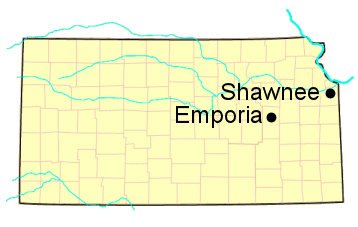| |
SUNDOWNERS CONTINUED..
I’ve been told my grandmother, too, was similarly driven. Two days after her triple-bypass, she was stumbling around the place, rag in hand, dusting. She scolded the attendants for allowing dust to collect. “God damn you if I don’t get a chance for letting all of this dust collect. Now look at this here fancy lamp. See all the sediment built up on the neck?” And if they persisted, tried to lead her back to her room, she would demand her slippers and her bag. I guess she figured that if she earned her keep, they’d let her leave. Or perhaps she too was running. She did such a job on the place, after a while the attendants tried to lengthen her stay. But eventually Grandma escaped. She stopped at the pay phone during one of her walks, called Grandpa and asked him to start up the cruddy blue Nova and come get her pronto. She abandoned the remainder of her pain-killing, cholesterol-maintaining medication into the phone’s coin return slot by the fistful. A passerby discovered the pills there later and notified an orderly. However, it was too late. Grandma had busted out. Sometimes I wish I was more like Grandma. Driven, driven in the right direction. She lives on a farm in Lucas, Kansas, about 400 miles from here (from KU Med Center in Kansas City, Room 403), and she lives with her eyes always open to the lives around her. For instance, she knows when a child’s catching the croup from miles away, and she’s notorious for making the long trot over with a home-remedy as soon as her pinched ears detect a cough or a wheeze on the night air. However, she never learned to how to drive. She certainly couldn’t help bail me out of here.
I can’t even begin to think who I’d call. Mother? No, she’d be out on the beat, running from interview to interview, from story to story. Sister? No, she’s still in California, probably getting her navel pierced. Father, nope. He’s miles away, pent up in a job site trailer, his eyes scanning the architect’s blueprints, hunting for flaws in the design, speculating at whether the walls will hold the ceiling, at whether the drains will channel the water, at whether the earthquake reinforcement is worth the while. My father slips on his tool belt without glancing at the buckle. Carpenters know their trade, even when they’re promoted slowly over the decades to foreman, then superintendent. They know where their tools are, always, and how to strap each into reach. I hear my father’s voice only on the phone now, my mother’s when she brings me flowers, my sister’s when I flip on the tube. I see my sister through the camera’s eye at the MTV Beach House in California, as an extra paid in pizza, fleeting fame, and luke-warm Crystal Light lemonade. She’s wearing a polka dot bikini and has a super-soaker squirt gun in hand. She takes aim at the camera man, while a boy with the body of a boxer, with yellow blow-up floaties around his biceps, lofts and plops her into the pool. No, if I want out I will have to get out on my own.
The nurse said the hospital attendants usually had to lock-down as early as 5:30 on the Sundowners, bolting them into their rooms, but because I was young, the attendants might never get around to locking mine. She said the Sundowners often wander aimlessly, babbling on about younger days, searching the hallways for their pasts.
At the end of the hallway, across the black and white checkered tile, is an elevator. On my way there I press the button to my morphine once and watch the bubbles in the bag rise to the surface. The nurse said it was advisable to press the button only once every fifteen minutes or so. I press the button again. Press the button twice and the taut skin between my shoulders and neck relaxes, almost heaps like a Chiarpe’s. Press four times and the throb from my stitches subsides. I press again. Press six times and I can no longer feel my spine. Again. Press eight times and I’ve left my own body and am floating somewhere above. I press the button repeatedly, as often as the dispenser allows.
Although I can hear the slap of my feet on the tile, I no can no longer feel my feet on the cold tile. I am floating, floating on a blow-up raft, the type I rode as a toddler, bounded only by the yellow plastic sides of a wading pool. My trunks are pulled up past my belly, and I’m wriggling my pink feet in the air madly as a beetle does when on his back.
The sun is just rising, and the air around is still purple. My mother drapes a hose into the pool, and the water rises. She seats herself in a lawn chair nearby and props her wicker hat down low over the stack of newspapers she is perusing. She keeps a lazy eye on me, peering at me now and again, sunning in her bathing suit, studying the news as the competition portrays it. My sister toddles out to join us, wrapped in a make-shift bikini fashioned from two red western-style handkerchiefs. She carries a stack of plastic cups, which she fills from the pool. She doles water from one cup to the next.
The sun drifts to midday, and in the distance we hear hammer-taps. My father hammers fence-slats into place, separating one small green suburban lot from the next. He hammers at a steady pace, each tap sounding a third above the last in pitch. Iron on aluminum has a certain ring. If my father only knew how, he could play our backyard fence like a xylophone or marimba, tapping each slat so it would sing. He carries on with his work, every now and again he pauses to wipe his brow, puts a hand on his hip and peers at us. We all stop and look at each other, as if signaled. It’s strange. We all just stare at each other for a moment, then continue on. Perhaps it’s something in the summer air which causes this, perhaps it’s something cool inside of each of us, like a shadow held over from winter exhaled and exchanged through the eyes.
Nowadays, however, we don’t spend summers together, and we don’t see each other unless there’s an accident at hand. These shadow-glances have all but disappeared.
My sister topples into the pool, then rights herself. I navigate my raft around the monster bubbles that rise to the surface, bubbles full of breath, bubbles full of mystery, bubbles full of medicine. I’ve somehow managed to block myself in between my morphine bag’s metal cart and the wall. I’ve reached the elevator doors.
I punch the down button and wait for the elevator to arrive. I consider exploring another ward. I consider immediate escape. Escape is not likely. They have taken my clothes. It would be too obvious if I strolled out in my hospital gown with my morphine bag held tight to my chest. No, I won’t be leaving my fix. Not yet anyway. I try the geriatric ward on two, contemplating my coming decision. They’ll keep me here another week. Hospitals always do. I press on. The sight of the old and wise might help. Can’t hurt.
In the geriatric ward the halls are packed. At the end of the hall through the bay windows I can see the orange sun nestled among the skyscrapers, preparing to set. I’m beginning to feel romantic, nostalgic. I start my way through the crowd to the windows, weaving past dribble-lipped men and men held fast to walkers, stepping then stopping their ways toward the sun. Not one of them glances at me as I pass. I watch their glassy-eyes. I take care not to cut in front of any of those in wheelchairs, their fingers wrapped with white adhesive, speeding toward the end of the hall. Some wear glasses, some wear goggles, some wear shades. I pass a flock of Southern belles, their hospital gowns flowing like summer dresses, their backs bowed. Their bifocals dangle on chains, leashed. They drag their rotted sandals across the tile. I maneuver my morphine carrier around and out.
The nurse said sometimes sundowners dreamed about others’ lives, about the inevitable progress of life. And this is when they are most dangerous. This is when they begin to open doors, interrupting surgeries, startling other patients, setting off fire alarms.
At the end of the hall just before the fire exit we line up against the windows, our eyes always on the glass, until the sun vanishes and all that remains is a faint glow just beyond the skyscrapers’ blades. And then, after the window’s surface has blackened and reflected our gazes, we turn and begin questioning each other. Only a few questions before the loneliness sets back in. Only a few questions before most of sundowners begin shuffling back into rooms. I stay on a little longer. I press my face to the glass, straining for the skyline. I look hard for something solid. Memories start to flood back, of my mother at the City Council meeting, a reporter’s notebook in hand; of my father cooped up in a job site trailer, his hand down every now and again just to make sure his hammer is where it should be on his belt; of my sister, after another audition, her hair and her belly full of sand. I find nothing. There are only a die-hard few sundowners left at the window now: a man with a sunken head; a woman who swings her socked feet in her wheelchair; and a man with half a face pale and blank, half live and twitching, who paces in front of the window.
I glance at the fire exit, judging the odds, counting the stairs in my mind from second floor to first. I’d never make it. For a moment I consider swinging the door and holding it open while the others rush out. I think better of it. No use exposing them to traffic. No use putting them through the mad squawks of the nurses and the manhandlings the young plump guards would surely give them.
The man with the sunken head shuffles off. The woman with the socked feet wheels away. The orderlies are coming. Neither wants any trouble today. However, the man with the split face remains. He paces in front of the window. Orderlies come to fetch him. They take hold of his arms and lift him off his feet, which continue to pace above the floor. He’s moving slowly and steadily away from something, something one step behind him. I fear for this man when the night comes. I fear for him, strapped to his bed, his feet incessantly pacing. When his feet stop, I know his pursuer will soon take him. I can see it in his eyes, and now I know I must stop my own senseless wandering. I know if I’m going to leave this place with both my body and my mind, I must face my own pursuer. I return to my room, flip off the light, and stroke my temples. The forceps dug in deep there. I lightly caress my stitches. The blade cut deep, but I didn’t flinch. I kept moving.
(Originally published in Event, 2005).
Return to Top of Page
|
|
|

![]() Return to Emporia
Return to Emporia![]() Return to KANSAS MAP
Return to KANSAS MAP 


